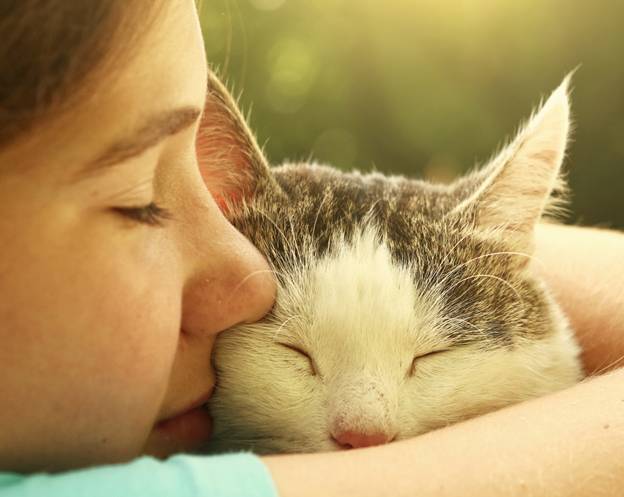I wanted to tell you about Colonel Deems and his dog Riley.
In a court case reported in the New York Times in 1908, it was announced that the Colonel’s attachment to his pet was “not evidence of a mental derangement.” Now, over 100 years later, we know even more: that Riley probably helped Colonel Deems stave off depression and anxiety associated with living alone as a bachelor.
-
Pets and Their Humans
People of all ages can benefit from any kind of pet – dogs small and large, cats, fish, birds, and even farm animals, amphibians and reptiles have a profound effect on our brain chemistry, making us feel good, soothing us through rough times, and providing loving companionship. Colonel Deems and Riley are an early illustration of the beneficial effects pets have on the humans who love them.

-
Pets and Stress
Some of the worst ailments we suffer are caused or amplified by stress. As primitive humans, we needed the mechanism in our brains that responds to stress, a hormone called cortisol, in order to survive. Odds were very good that if we were under stress, it was because we were in some sort of danger that required a response, which today we call “Fight or Flight.” The release of cortisol triggered the release of glucose and adrenaline to our blood so we would have the energy to handle the danger. Back then, “danger” was predators and nature, and the cortisol and other hormones would get burned off by exertion. But in a world where we are more often prey to paperwork and deadlines than tigers or bears, that exertion just isn’t happening. The effects of having these hormones in our bodies on long-term basis can cause or elevate diabetes, high blood pressure, and heart disease, among other types of damage. This is why the studies that show reduction of stress symptoms as a result of contact with pets is so significant.
-
Pets and Oxytocin
Indeed, pets have the opposite effect, in that they cause the release of oxytocin, a happiness hormone that brings calm and focus. This hormone is most associated with mothers’ brains the delivery and care of infants, but sure enough, our pets bring it out in all of us, plus a few other of our feel-good hormones such as dopamine and serotonin, the latter of which is what antidepressants try to elevate.
The physiological effects of these hormones on the body? Decreased heart rate, inhibition of cortisol, and the release of calming hormones (the fact that our presence does this to our pets as well is an added bonus!).
-
Pets and Kids
These soothing physiological and psychological benefits have been studied especially with regards to two age groups. The first is children, who receive a host of benefits from regular interaction with pets, including a heightened sense of responsibility and an increased awareness of the feelings of others. Pets also help children with issues of loneliness the same way they help adults, so they can help children build social skills and self-esteem they may not be getting from having lots of friends. Numerous programs have applied pets therapeutically by introducing them to underprivileged, abused, neglected, and “problem” children and teens.
-
Pets and the Elderly
The other age group that particularly benefits from interaction with pets is the elderly. Elderly people do have unique concerns with regards to pets, such as considering their own health, the size and liveliness of the pet, or the pet’s health. However, all of the same benefits apply, and this can be critical for the elderly. As friends and relatives begin dying, elderly survivors can fall prey to depression and inactivity. Healthy and active elderly people can meet others in the course of purchasing toys for a cat, walking a dog, or grooming a horse. Elderly people in poor health should probably consider a less active pet, but even a goldfish or a turtle can cause the release of those balancing happy hormones. Terminal patients have shown a more calm and focused approach to their diagnosis when exposed to pets.

The joy pets provide us with, gives us more than just happy emotions. Those emotions have benefits to our overall health. Pets provide us with peace, calm, and love, and that transfers to ourselves and those around us. Like the positive outlook Riley provided Colonel Deems, our pets make us feel good mentally, and that in turn makes us more healthy physically.
 Amber Kingsley
Amber Kingsley
Amber Kingsley is a freelance writer whom has donated countless hours supporting her local shelters. With writing, she has spent most of her research on animals with regards to food, health and training.




 Amber Kingsley
Amber Kingsley

